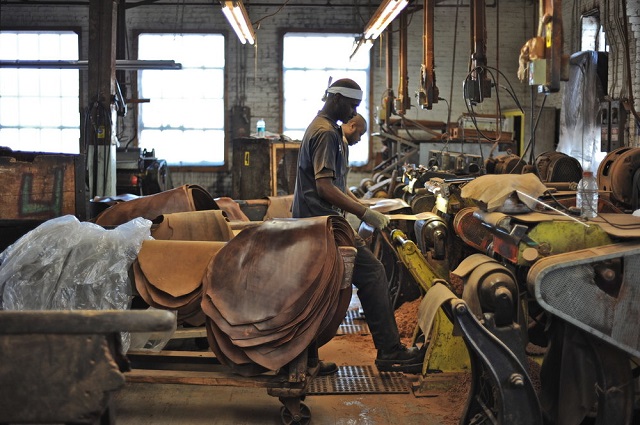
Bulawayo, Zimbabwe | Tafara Mugwara – Xinhua | Twenty-year-old Mduduzi Jele is eagerly learning the art and craft of leather making from one of the industry’s seasoned experts.
With steadfast determination, Mduduzi Jele, son of a leather technician, hopes to accumulate the prized skill so that he can also pass it down to the next generation.
Mduduzi Jele is one of several young men who have been brought in by Boustead Leather company, a tannery based in Bulawayo, Zimbabwe’s second-largest city, to learn the craft of leather making from senior technicians.
“I started working in the leather industry because I wanted to learn after seeing my father sewing different products at home from leather, so l was so curious to know how the materials were produced,” Mduduzi Jele told Xinhua.
His mentor Cecil Rusere believes that it is his social responsibility to pass down the knowledge that he has acquired over the past 32 years in the leather industry.
He said Zimbabwe’s position as a competitive leather producer can only be safeguarded if the old impart their wisdom to the young.
“I realized that it is important to teach the youngsters to accumulate knowledge so that our country develops. If I don’t share this knowledge, I will get old and die with the knowledge,” said Rusere.
Boustead Leather has a production line that encompasses the purchase of hides, tanning, designing, taxidermy and training. All products are handmade in its workshop in Bulawayo.
For Mduduzi Jele, the determination to keep his father’s legacy alive drives him.
“What l see so important about being taught by our fathers is that as they are growing old, and as young people we need to know the skills so that when the old men retire we will continue running the company,” he said.
Rusere said being in the industry gives him a chance to share the knowledge that he has accumulated over the past three decades and nurture the next generation of leather technicians.
“In my department, I have eight young men that I am working with, they are already well vested with production processes, even in my absence they can do the work on their own,” he said.
Mduduzi’s father, Themba Jele, who has been in the leather industry for the past 33 years, hopes to keep his legacy alive through his son.
“The reason I brought him to work here is that he remains with vast knowledge about the leather industry because I’m getting old and I’m very close to retiring, and if l retire l should do so after imparting so much knowledge in him that will help him be in the same or better level like me in this industry,” he said.
“My legacy in the leather industry is substantial, and these young people that l have impacted knowledge will continue with my legacy and this will make the leather industry continue to grow for more generations to come,” added Themba Jele.
IMPARTING KNOWLEDGE TO NEXT GENERATION
Sibusiso Sibanda, Managing Director of Boustead Leather, is making sure that Bulawayo’s rich knowledge and tradition in leathercraft are utilized to the fullest by bringing in young recruits so that they can learn from the old.
“The interesting team that I have here is about four generations, where there are the sons, the fathers, the grandfathers and the great grandfathers that worked here,” he told Xinhua.
Sibusiso Sibanda, who is a leather technologist and taxidermist, said the secret to succeeding in the industry is to work as families.
“So what we do, we are imparting our knowledge to our sons that they will eventually impart with their sons and their sons. Some of these elderly people that I am with, their fathers used to work here, including their grandfathers,” said Sibusiso Sibanda.
Today about 45 seniors are mentoring a group of 18 youngsters at the company.
Sibanda’s son, who is still in high school, also comes to learn during the school holidays. By doing so, generational knowledge in the leather making is kept alive in families.
“The leather industry is like boat building. The knowledge has always been kept a secret because there are recipes involved. So it’s always been kept in families, so you find a family of good recipe makers, a family of good shavers, a family of guys that know how to grade, so they are different departments that are run by family members,” Sibusiso Sibanda said.
Another young man, Bongani Sibanda (not related to Sibusiso), was brought by his father to learn the art of leather making at the company.
“l found the industry very interesting and most of the time my father would encourage me to take the job and showed me how different products were made even from leather leftovers and the whole process of leather production, so that is the time l joined my father in the industry,” he said.
Bongani’s father, George Nhondoro Sibanda, said he brought his son into the industry so that the knowledge can be passed on to the next generations.
“I have been working at this company for the past 35 years. I decided to bring my son to this company so that he can accumulate the knowledge that I also acquired at this company. He will continue gaining the knowledge and teaching others, even to bring his children in this industry,” said George Nhondoro Sibanda.
“With my father retiring anytime soon, l foresee myself continuing because lam now used to my work, it’s now in my blood,” Bongani Sibanda said.
DEVELOPMENT THROUGH VALUE ADDITION
Bulawayo, previously Zimbabwe’s industrial capital, has over the past decades lost its glory due to the impact of Zimbabwe’s economic challenges.
As a result, many companies closed, which resulted in experienced workers moving abroad, or leaving the industry.
Through Sibusiso Sibanda’s efforts, the talent is being brought back to Bulawayo and utilized to ensure that the city reclaims its dominant position in the leather industry regionally.
“In our industry, we have decided to keep it old school, the reasons being our cows are organic, our leather becomes organic,” Sibusiso Sibanda said.
“We have kept our old machines which will give us the old school way of doing our leather which is highly sought after in the bespoke market,” he added.
Increased production has seen the company spreading its tentacles to foreign markets including China.
“We have some of our hides which will be going to China very soon, we have had very few inquiries, because we were at the Dubai leather expo, so we met quite a number of people that are interested in our leather,” said Sibusiso Sibanda.
Through a partnership with the Zimbabwe National Parks and Wildlife Authority, Boustead Leather exports leather products made from game.
Some of the exotic leather projects include crocodile, zebra, wildebeest, and impala, among others.
Zimbabwe has a long history of leather production dating back to the Stone Age era.
By the 1990s, the country had one of the most sophisticated leather industries in the region. This was eventually affected by economic sanctions imposed on the country by the West in the early 2000s.
Estimates indicate that leather shoe production has plummeted to 1.5 million pairs annually from a peak of 17 million in the 1990s.
To revive the leather sector, the government last year launched the Zimbabwe Leather Sector Strategy (2021-2030) to increase investments in the sector and maximize value-addition and beneficiation. ■
 The Independent Uganda: You get the Truth we Pay the Price
The Independent Uganda: You get the Truth we Pay the Price


